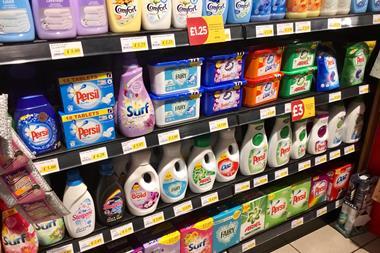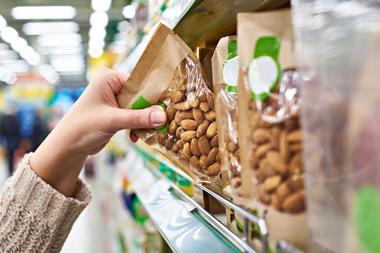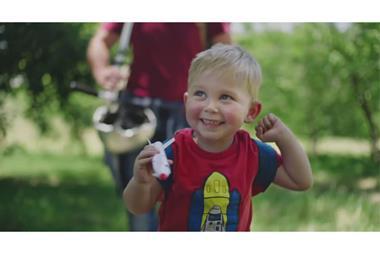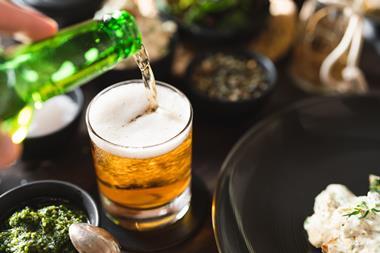A tight range of easy-to-navigate baby and toddler essentials and a welcoming atmosphere can be real lifesavers for stressed out, time-poor parents.
Pity the poor parents of under-fives. Their sleepless, red-rimmed eyes reveal that they’ve got more to worry about than cleaning up that ripe-looking organic matter at the bottom of baby’s changing bag.
With inflation now on the march, prices in the £733m baby food, drink and milk category (Mintel) are shooting up faster than their kids. Plus, with Brexit-fuelled exchange-rate uncertainty on the horizon, this pressure is likely to continue.
It’s certainly a worry if you’ve got a couple of new mouths to feed – but what’s this all got to do with the convenience channel? Well, as Richard Inglis from Parkview Retail says, it’s changing the way parents shop the pre-school category.
“I think that the whole market has changed massively in the past few years,” says Richard, the owner of several stores in Southampton.
“Personally, it’s been a while since I’ve been at ‘the baby stage’ with my family. But I know that for most parents cost is a really huge factor. And, unfortunately, whatever you do with price, it’s always going to be cheaper to stock up on nappies and other baby stuff at Amazon or the supermarkets.”
However, this doesn’t mean it’s time to throw out the nappies and despair that more key sales are heading online to bolster the profits of the world’s richest man.
As Richard explains, in the world of infant and babycare not all purchases can be planned in advance. And if you’re right there for the parents who have run out of formula milk at 6.30am, require wipes following an all-too-public poo explosion, or restorative wine after bedtime, they’re more than happy to pay a (reasonable) premium to get what they want, when they want it.
“What we can really be there for is the everyday distress purchase,” he says.
“So what we’ve done is cut back to the best-sellers in our stock. That means creating a tight little range – the real basic essentials – that will serve anyone who’s coming in on that kind of mission.
“For example, we do the ready-to-drink milks, a couple of Ella’s Kitchen pouches and three sizes of nappy. They’re all distress-based buys which cover the main parent shoppers.”
Choosing a compact edit of the right products also suits Debbie Deeley, manager of Lawrence Hunt Spar Heskin, Lancashire, down to the ground. Debbie describes her demographic as very much “older customers – it can be a very expensive place to live round here”.
Still, to satisfy the needs of any passing grandparents (or visiting grown-up kids) on baby duty, she stocks an essential selection of preschool stuff.
“It’s not massive, probably about the same size as our OTC medicine section,” she says.
“But that said, we do sell quite a lot of stuff out of it, although it isn’t a huge category overall. So we do baby milk, baby wipes – all those. You kind of do have to do it to meet the needs of those shoppers when they come in.”
As Debbie and Richard’s comments show, every store can benefit from basic infant and baby products. Meanwhile, other retailers can afford to be a bit more expansive with their approach. Especially if you’re retailing in a busy area that’s teeming with families, such as Stuart Cordner’s Spar in Dundonald, Northern Ireland.
“Basically, where we are is half a mile from a children’s primary school,” he says. “The adjacent property is a children’s dance studio and there’s a nice park nearby, so we’re well-covered when it comes to little ones and parents.”
Stuart says that this translates to a lot of different parent-powered missions. Often these are based around the daily school run.
“We get a lot of mothers and toddlers in the store, especially first thing in the morning,” he says.
“They’ll be taking older siblings to school and then popping in on the way back. It’s then that they might need a top-up of essentials. Then in the afternoon they’re looking for grab-and-go hot food, or sandwiches to take away. Food is a really big pull for them so they don’t have to make something at home.
“It’s a type of customer that we see multiple occasions in a day. They’re very good for us!”
And Stuart is very good to them in return. As well as his customary warm welcome, he’s launched a loyalty card which he says “is very popular with the 20-something parents with a couple of young kids”.
Customers get a stamp for every £10 they spend and then, after a certain number of visits, get rewarded with a fiver off their grocery shop. He believes that it’s a good way to get high-spending customers on-side and give them an extra incentive to keep them coming back.
Stuart adds that the big driver for little ones is his selection of sweets and ice cream, and that pester-power has led to a few good tantrums in-store. While the kids are eyeing the confectionery, parents can shop from a metre area dedicated to babies and infants.
He says that wipes are the fastest-growing product here. That’s not surprising, since Mintel identifies wipes as the biggest segment in baby and children’s toiletries.
Stuart reckons that their popularity is all about convenience. “Wipes are big for us,” he says.
“They’re ready to go and really easy to use. So if a kid’s just gone to the park and has a dirty face the parent doesn’t need sanitiser or any kind of moisture, they just rip off the top and bang – face all clean. It’s convenient, and that’s what the whole category’s about.”
Recognising how essential wipes are to a parent’s kit bag, Huggies has gone one step further and created a new flushable and biodegradable moist toilet tissue to aid potty training while salving mums’ and dads’ eco worries.
Kimberly-Clark childcare marketing manager Carly Hunter says baby and change time will remain a competitive category “so continued innovation across product, communication and channel execution will be key to unlocking category growth”.
Give them an extra boost
On colder days parents want to cram as much protective goodness into their little ones as possible. With this in mind Bassetts Vitamins has launched Omega-3+ Multivitamins orange flavour pastilles, aimed at three- to six-year-olds. As well as Omega-3 to support development, they feature vitamin B6 for normal psychological function and B5 to support mental performance.
“We know benefits such as Omega-3 have a strong pull for parents,” says Bassetts Vitamins marketing manager Skye Lucas-Banks.
A bigger audience
If you’re planning to go big on the infant and baby category, the advice from the shopfloor is that key distress products, and a welcoming attitude to parents, are the way to go. Also, if you’re in a parent-packed area, providing meal solutions aimed at the whole family might boost sales too.
Mintel says that eight in 10 parents of under-fours prefer to choose meals that reflect the time of day. It suggests that this presents an opportunity to group food together in-store to reflect this, with 70% of the same parents preferring toddler meals grouped by occasion.
But however well you merchandise, or choose products, Stuart reckons there’s one thing that can really put off yummy mummies and delectable daddies – lack of space.
“I’ve seen it in so many other convenience stores,” he says. “So the aisles might be wide enough to get a buggy down. That’s fine. But what happens when they have a couple of kids, or a double buggy? If space is too tight then you won’t get that customer coming anywhere near you. And if they do try they’ll be barging into things on the aisles.
“That’s why we’ve made sure our aisles are wide enough. It sends out the right signal that parents are welcome.”
Healthy snacking in the bag
Much like their parents, pre-school kids love a snack, but as the trend for health continues to shape the grown-up market so it does the junior category, too.
“When it comes to choosing their child’s snack, 97% of parents say ‘healthy’ is their number one reason for purchase (Organix research),” says Mark Smith, channel manager for convenience and high street at Organix.
“According to our research, 87% of parents want healthy and nutritious snacks for their little ones and 68% wish there were healthier options available. More than anything parents want to feel good about giving their children a snack – to trust that it’s healthy, tastes great and that their child will enjoy it.”
Smith adds that finger foods and snacks remain the biggest growth area within baby and toddler food and the highest penetration area of baby food, with the firm’s apple rice cakes and carrot sticks proving popular.
“We use only the best organic ingredients and nothing unnecessary is added, it’s our Organix No Junk Promise and gives parents the added reassurance of food they can trust for their little one,” he says.
“With 44% market share, our foods are bought by more households with children under four years than any other baby food brand in the market, and with two of the top three skus Organix ticks the box for




























No comments yet